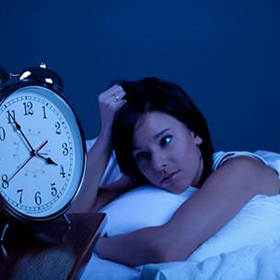
While many factors can contribute to insomnia and poor sleep undoubtedly the most important one in the twenty first century is stress. Increasing research shows that there is an activation of the stress-response system and the degree of sleep disturbance experienced correlates with the level of stress-response activation and that insomniacs and others with poor sleep patterns experience more psychological stress. Including scoring higher in a psychological distress survey and being more sensitive to stressful conditions.
Unfortunately there can be a vicious cycle of stress poor sleep and more stress. If you are not getting enough sleep, you have to rely more and more on your alarm clock, and if you oversleep and wake up already fatigued.
The stress response stimulates production of many chemicals which elevate blood glucose levels, raise heart rate, and alter the secretion of cortisol which makes it hard to relax enough to sleep restfully, and without enough rest, the body will not be able to readjust to a normal circadian rhythm, prolonging the cycle of feeling stressed and restless.
In a study using fifty-three women with insomnia (and seventy-eight controls), insomniacs had higher levels of urinary morning cortisol and also scored significantly higher on a psychological distress questionnaire than did the controls. A similar study found the insomniac group slept for a shorter amount of time under high-stress conditions than under low-stress conditions, while the normal sleeper group showed no variation across conditions.
In another study although all subjects reported equivalent numbers of daily stressful events, people with insomnia found the impacts of these events to be more severe. Insomniacs also experienced major life events more intensely, were much more alert before bedtime, viewed their lives as more stressful, and used emotionally-based coping strategies to deal with stress more often than did the normal sleeper group. The study concluded that the way insomniacs perceive and process stressful events as being beyond their control was perpetuating their insomnia. It appears that although normal sleepers and insomniacs experience similar types of stressful inputs in insomniacs the stress-response is more sensitive to these inputs and its activation leads to lack of sleep.